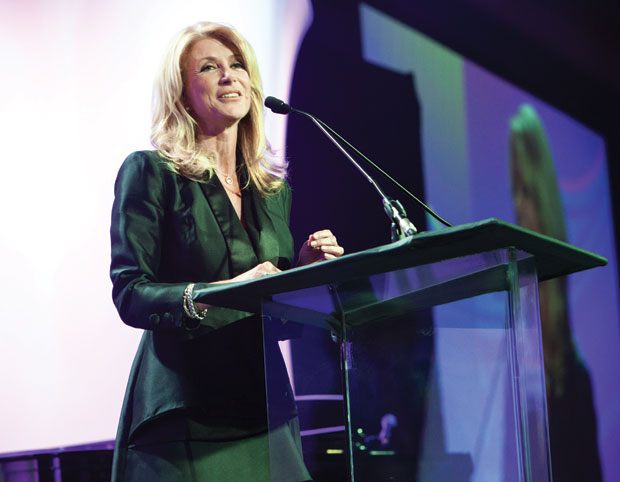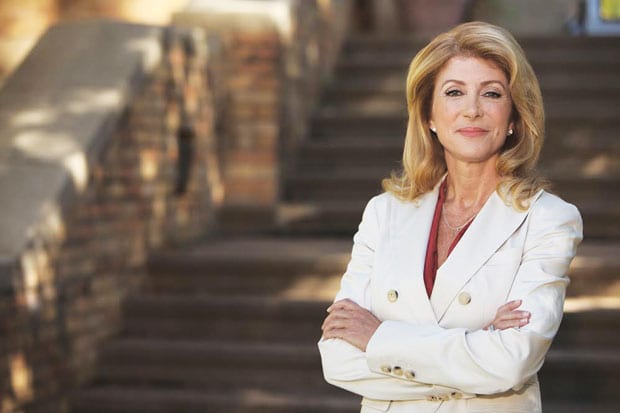In our exclusive interview — her first with the gay press — Davis defends record of gay support and blasts opponent
In her first interview with the gay press, state Sen. Wendy Davis, the Democratic nominee for governor, affirmed her support for marriage equality, employment and housing nondiscrimination, and said she would like to strengthen the bullying bill she shepherded through the Senate Education Committee.
Connecting with the LGBT community is a priority for the Davis campaign, but some have criticized her avoiding gay issues, even when addressing LGBT groups. During the campaign, she has attended a number of events with the LGBT community and fundraisers thrown by community members. She mentioned Black Tie Dinner, in particular. “What a special night that was,” she said. But despite a spirited reception from the audience, during her brief address to one of the largest fundraisers in the nation for LGBT groups, Davis neglected to use the term “gay,” “LGBT,” “marriage equality” and the like. Similar omissions were noted when she spoke at several high-dollar private fundraisers.
And while she hasn’t been silent on gay issues — Davis called on Abbott to stop defending the state’s ban on same-sex marriage during her endorsement interview with the San Antonio Express-News in February — she hasn’t addressed that issue directly with her LGBT audiences. When her campaign contacted Dallas Voice about her first one-on-one interview with a gay media outlet, they said Pride month was a good time to do that, and that Davis wanted to make her positions clear on a number of issues affecting the LGBT community.
In doing so, Davis also made several jabs at Attorney General Greg Abbott, the Republican nominee and her opponent in the general election this November. Abbott intervened in two same-sex divorce cases in Texas; when he missed the statute of limitations in one of those cases to bring a challenge, he had the legislature change the law. Davis called his position absurd.
“I like to say that Texas right now is a state where you can’t love who you choose to love and you can’t hate who you choose to hate,” she said. “It’s such a great irony, right? If [Abbott] stands against marriage equality, why in the world would he stand against someone being able to dissolve a marriage he says he doesn’t agree with in the first place.”
………………….
Dallas Voice: Why has it taken you until this stage of the campaign to talk about LGBT issues? Wendy Davis: When we started the campaign, I wanted to focus on education. Obviously, that cuts across every person, no mater what orientation, race [or] income level. But I, of course, am very committed to LGBT rights and am proudly speaking about my history — the anti-discrimination ordinance in Fort Worth [which] was the first in the state, my work on anti-bullying and my support for marriage equality.
In two recent marriage-equality cases (Oregon and Pennsylvania), the state attorneys general refused to defend the state law while the respective governors — one a Democrat, one a Republican — decided to abide by the Appeals Court decision and not appeal the decision. Is that what you’d do as governor? Absolutely. That would be my position, and it would be a clear contrast to what Greg Abbott has admitted his position on that issue is. Unlike the attorneys general you just mentioned, he, of course, is fighting to defend the constitutional ban on gay marriage in Texas, and has been very vocal on his opinion on that.
How do you see marriage equality playing out in Texas? The courts will be the first place to answer the question. Depending on what they do, Texas will reexamine the next step. I would not at all be surprised to see Texas voters ultimately move this issue forward through another vote on this, and I certainly would be supportive of putting the issue to a vote in Texas if we don’t find resolution in the court system.

BLACK TIE APPROVAL | During her brief speech at Dallas Black Tie Dinner last fall, Davis neglected to mention gay-specific issues, but has now come out strongly in favor of marriage equality and gay-inclusive nondiscrimination laws. (Chuck Marcelo/Dallas Voice)
What are you hearing around the state? Do you think enough Texas voters would repeal that amendment? With the exception of the Republican convention going on in my hometown of Fort Worth [last week], yes. That is what I’m hearing around the state. I think it’s in keeping with the evolution we’re seeing on this issue around the country. People are bringing younger, fresher, nonjudgmental perspectives in our state just as they are in other places, and it’s only a matter of time before we evolve to a point other states have on this issue.
An issue that affects even more people than marriage equality is employment nondiscrimination. How would you deal with that? Absolutely right. In Fort Worth, we were the first to pass an anti-discrimination ordinance in employment and housing and it was used as a model for other Texas cities.
I was thrilled to see Houston successfully pass their ordinance [last month]. It looks like it’s going to come under some challenge in one form or another. I’m not sure what that will look like. But when that first began to move forward in Houston … I don’t exactly recall what Greg Abbott said about it, but he gave evidence of his disagreement with Houston moving forward. He talked at one point about trying to block the implementation, which I found so surprising because other major cities in Texas have long had these ordinances in place. Fairness in the workplace should belong to everyone, and the idea that we would exclude anyone from fairness in the workplace is not in keeping with Texas or American values.
Was passage in Fort Worth in 2000 as contentious as it’s been recently in San Antonio and Houston? It took us awhile. There had been attempts to pass that ordinance in prior city council years and we were split. One of the most vocal opponents [was city councilman] Chuck Silcox. He had a conversation with someone who he cared for deeply, who shared his personal journey of discrimination. It changed Chuck’s mind, which shows the power of putting a face on these issues. And when Chuck proudly came forward to support that ordinance, I believe the council came along [with a vote of] 6 to 1. That was a very important and symbolic moment, and it reminded me of the power of human stories in policymaking.
You worked toward passage of the anti-bullying bill through the Senate Education Committee and the state Senate. The final bill was a compromise. Now that it’s been in force a couple of years, what would you do to improve it? I’ve watched implementation of the bill in my home community of Fort Worth. We had someone from the LGBT community who was a real leader on that. His name was Jon Nelson. He worked with the school district to implement a very thorough teaching-training-education platform for the teaching and administrative community. Last time I spoke to him, he was very pleased with how well it was being received and implemented. What I don’t know is how it’s been received across the state. That’s a very good question to ask as part of our work.
Was there anything you were disappointed that was taken out of the bill? Yes, I was very disappointed that we weren’t able to extend it to online bullying. In today’s social media world, especially among our young kids, that’s where a lot of our bullying is taking place. I understand we can’t ask educators to police the Internet. But what the bill would have called for is the empowerment of teachers and administrators — where information comes to their attention about online bullying to be empowered to address it.
What’s at stake in this election? What this race is about is [that] all hardworking Texans — no matter their gender or race or orientation or background — have an opportunity to be a vibrant part of who we are and the varying policies and diverse policies that Greg Abbott and I have in regard to a myriad of issues will be a real reflection of whether we’re able to advance the issues of hardworking Texans or not. There’s a lot at stake here.
This article appeared in the Dallas Voice print edition June 13, 2014.


